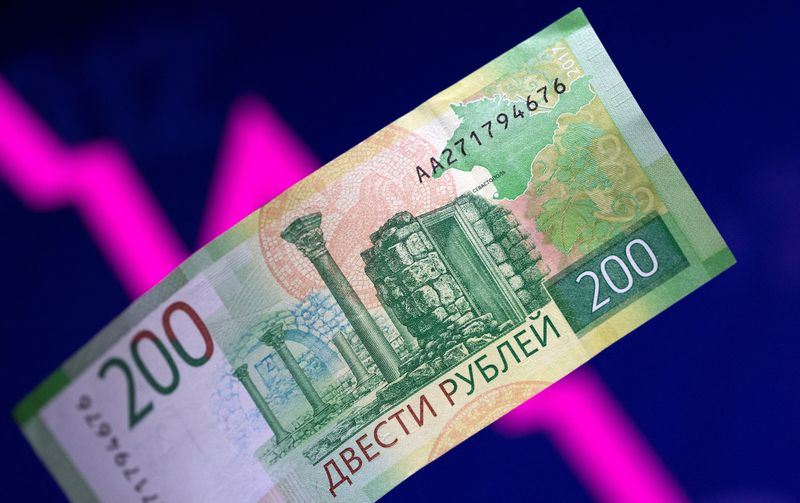
© Reuters. FILE PHOTO: A Russian rouble banknote is seen in front of a descending stock graph in this illustration taken March 1, 2022. REUTERS/Dado Ruvic/Illustration
By Megan Davies
NEW YORK (Reuters) -Russia’s coupon payment on a sovereign bond maturing in 2029 was processed by correspondent bank JPMorgan Chase & Co (NYSE:JPM), a source said on Monday, the second time in recent days the country appears to have averted default.
Russia had been due to make a $66 million payment to bondholders on Monday on the bond.
Last week, it paid interest due on two sovereign bonds, easing doubts about its willingness and ability to honor external debt after harsh sanctions were imposed by Western nations following its invasion of Ukraine.
Making the payment meant Russia avoided its first default, for now, since a 1998 financial crisis and its first on international bonds since the 1917 revolution.
JPMorgan worked on Monday with the U.S. Treasury Department on necessary approvals, the source familiar with the situation said.
The payment had moved on to the next step before the money is handed over to bondholders, the source added. Reuters could not learn which bank was acting as the payment agent on the bond.
Last week, JPMorgan processed the payment as correspondent bank and handed it to Citigroup Inc (NYSE:C), which as payment agent distributed the funds on to bondholders.
Russia has 15 international bonds outstanding with a face value of around $40 billion. Prior to the Ukraine crisis roughly $20 billion was held by investment funds and money managers outside Russia.
The country’s next test is a $102 million payment on March 28 and after that on March 31 there is a $447 million payment that must be made in dollars. Its biggest payment of the year — and its first full repayment of “principal”, of $2 billion — is due on April 4.
Even if Russia is willing to pay, there may be complications in the coming weeks and months, especially for bonds that must be serviced in dollars, after a temporary license issued by the U.S. Office of Foreign Assets Control expires on May 25. Russia will still have almost $2 billion worth of external sovereign bond payments to make before the end of the year.
If Russia does not make any of its bond payments within their defined grace periods, or pays in roubles where dollars or euros are specified, it will be a default.
Russia’s rouble on Monday steadied and OFZ treasury bonds returned to trading, although in a volatile fashion. Stocks and bonds last traded on the Moscow Exchange on Feb. 25 and the central bank has yet to say when trading in equities can resume. Russia invaded Ukraine on Feb. 24, calling it a “special operation.”
Source: Investing.com




























